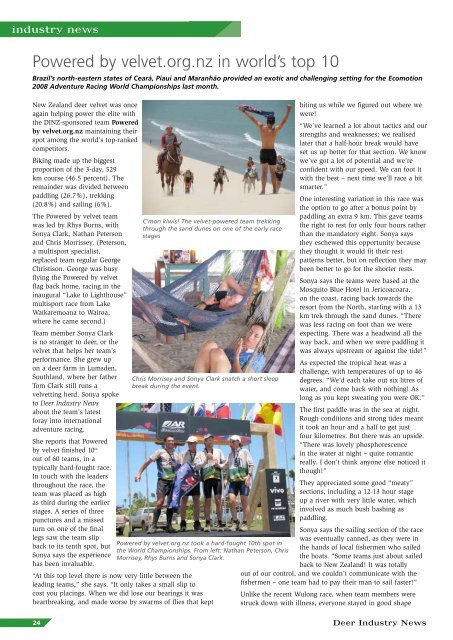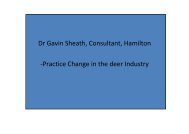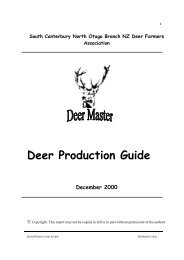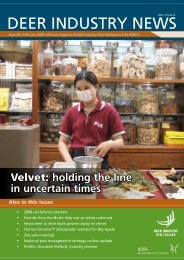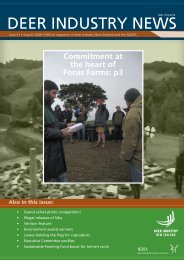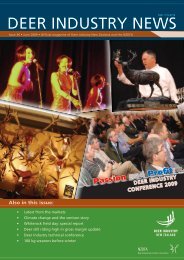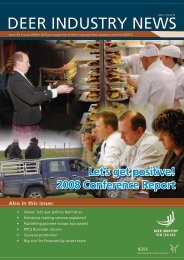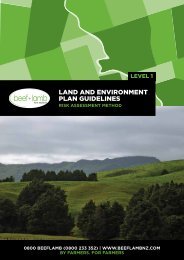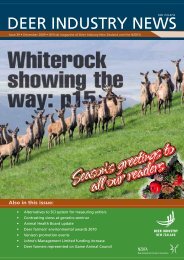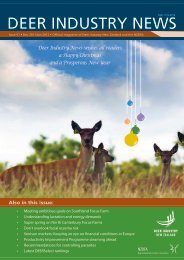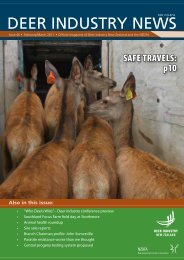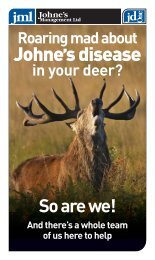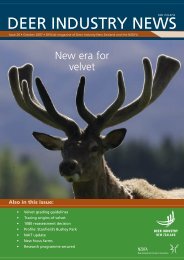Deer Industry News - Deer Industry New Zealand
Deer Industry News - Deer Industry New Zealand
Deer Industry News - Deer Industry New Zealand
Create successful ePaper yourself
Turn your PDF publications into a flip-book with our unique Google optimized e-Paper software.
industry news<br />
Powered by velvet.org.nz in world’s top 10<br />
Brazil’s north-eastern states of Ceará, Piaui and Maranhão provided an exotic and challenging setting for the Ecomotion<br />
2008 Adventure Racing World Championships last month.<br />
<strong>New</strong> <strong>Zealand</strong> deer velvet was once<br />
again helping power the elite with<br />
the DINZ-sponsored team Powered<br />
by velvet.org.nz maintaining their<br />
spot among the world’s top-ranked<br />
competitors.<br />
Biking made up the biggest<br />
proportion of the 3-day, 529<br />
km course (46.5 percent). The<br />
remainder was divided between<br />
paddling (26.7%), trekking<br />
(20.8%) and sailing (6%).<br />
The Powered by velvet team<br />
was led by Rhys Burns, with<br />
Sonya Clark, Nathan Peterson<br />
and Chris Morrissey. (Peterson,<br />
a multisport specialist,<br />
replaced team regular George<br />
Christison. George was busy<br />
flying the Powered by velvet<br />
flag back home, racing in the<br />
inaugural “Lake to Lighthouse”<br />
multisport race from Lake<br />
Waikaremoana to Wairoa,<br />
where he came second.)<br />
Team member Sonya Clark<br />
is no stranger to deer, or the<br />
velvet that helps her team’s<br />
performance. She grew up<br />
on a deer farm in Lumsden,<br />
Southland, where her father<br />
Tom Clark still runs a<br />
velvetting herd. Sonya spoke<br />
to <strong>Deer</strong> <strong>Industry</strong> <strong><strong>New</strong>s</strong><br />
about the team’s latest<br />
foray into international<br />
adventure racing.<br />
She reports that Powered<br />
by velvet finished 10 th<br />
out of 60 teams, in a<br />
typically hard-fought race.<br />
In touch with the leaders<br />
throughout the race, the<br />
team was placed as high<br />
as third during the earlier<br />
stages. A series of three<br />
punctures and a missed<br />
turn on one of the final<br />
legs saw the team slip<br />
back to its tenth spot, but<br />
Sonya says the experience<br />
has been invaluable.<br />
C’mon kiwis! The velvet-powered team trekking<br />
through the sand dunes on one of the early race<br />
stages<br />
Chris Morrisey and Sonya Clark snatch a short sleep<br />
break during the event.<br />
Powered by velvet.org.nz took a hard-fought 10th spot in<br />
the World Championships. From left: Nathan Peterson, Chris<br />
Morrisey, Rhys Burns and Sonya Clark.<br />
“At this top level there is now very little between the<br />
leading teams,” she says. “It only takes a small slip to<br />
cost you placings. When we did lose our bearings it was<br />
heartbreaking, and made worse by swarms of flies that kept<br />
biting us while we figured out where we<br />
were!<br />
“We’ve learned a lot about tactics and our<br />
strengths and weaknesses; we realised<br />
later that a half-hour break would have<br />
set us up better for that section. We know<br />
we’ve got a lot of potential and we’re<br />
confident with our speed. We can foot it<br />
with the best – next time we’ll race a bit<br />
smarter.”<br />
One interesting variation in this race was<br />
the option to go after a bonus point by<br />
paddling an extra 9 km. This gave teams<br />
the right to rest for only four hours rather<br />
than the mandatory eight. Sonya says<br />
they eschewed this opportunity because<br />
they thought it would fit their rest<br />
patterns better, but on reflection they may<br />
been better to go for the shorter rests.<br />
Sonya says the teams were based at the<br />
Mosquito Blue Hotel in Jericoacoara,<br />
on the coast, racing back towards the<br />
resort from the North, starting with a 13<br />
km trek through the sand dunes. “There<br />
was less racing on foot than we were<br />
expecting. There was a headwind all the<br />
way back, and when we were paddling it<br />
was always upstream or against the tide!”<br />
As expected the tropical heat was a<br />
challenge, with temperatures of up to 46<br />
degrees. “We’d each take out six litres of<br />
water, and come back with nothing! As<br />
long as you kept sweating you were OK.”<br />
The first paddle was in the sea at night.<br />
Rough conditions and strong tides meant<br />
it took an hour and a half to get just<br />
four kilometres. But there was an upside.<br />
“There was lovely phosphorescence<br />
in the water at night – quite romantic<br />
really. I don’t think anyone else noticed it<br />
though!”<br />
They appreciated some good “meaty”<br />
sections, including a 12-13 hour stage<br />
up a river with very little water, which<br />
involved as much bush bashing as<br />
paddling.<br />
Sonya says the sailing section of the race<br />
was eventually canned, as they were in<br />
the hands of local fishermen who sailed<br />
the boats. “Some teams just about sailed<br />
back to <strong>New</strong> <strong>Zealand</strong>! It was totally<br />
out of our control, and we couldn’t communicate with the<br />
fishermen – one team had to pay their man to sail faster!”<br />
Unlike the recent Wulong race, when team members were<br />
struck down with illness, everyone stayed in good shape<br />
24<br />
<strong>Deer</strong> <strong>Industry</strong> <strong><strong>New</strong>s</strong>


